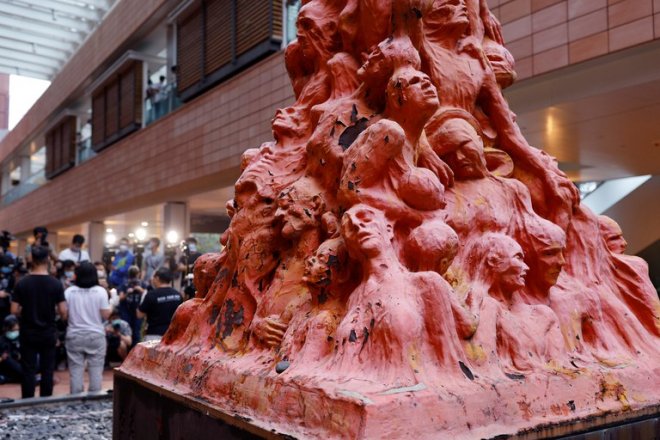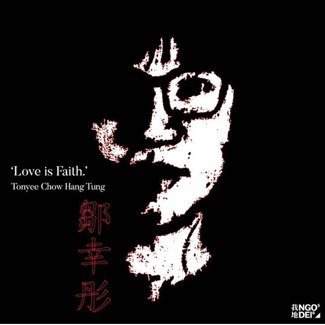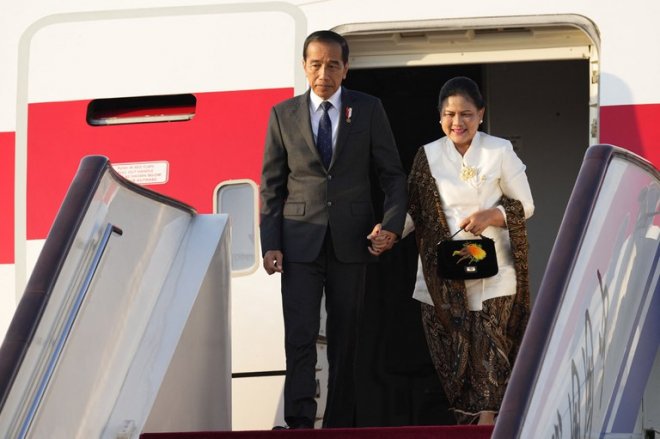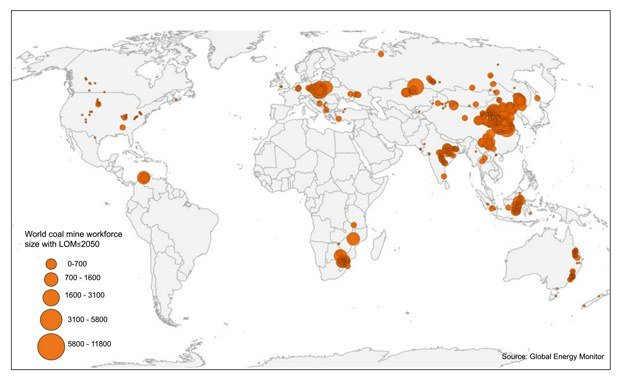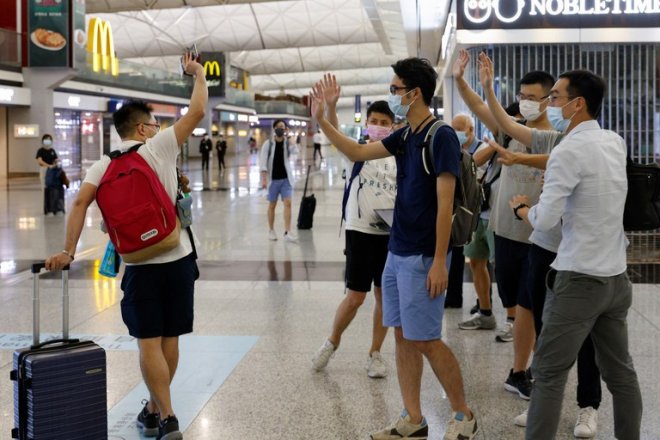Uyghur tightrope walker criticized for selling out to Beijing’s assimilation efforts
Dressed in ancient Chinese warrior garb, Uyghur tightrope-walker Adil Hoshur navigated a 590-foot (180-meter) wire over a plunging valley in Sichuan province that was broadcast live as part of a government-organized Lunar New Year celebration.
While Hoshur’s performance may have delighted Chinese viewers and officials, fellow Uyghurs saw it as yet another example of Beijing’s aggressive attempts to erase their distinctiveness and assimilate them into majority Han Chinese culture.
“Forcing Uyghurs to dress as Chinese, sing Chinese songs and perform Chinese dances is a planned, organized political scheme through which the Chinese government intends to destroy Uyghur people’s national spirit,” said Rahima Mahmut, a Uyghur singer and political activist who now lives in London.
Uyghur activists living abroad harshly criticized Hoshur, known as the “prince of the sky,” for selling out to Beijing and aiding the Communist Party’s propaganda campaign.
Aygul Memet, a colleague of Hoshur’s in an acrobat troupe from 1990 until she defected to Canada in 2004, said she was not surprised that he participated in the event.
“He always put his interest above everything else, and we kept many things secret from him as we viewed him as a government loyalist at the time,” she told Radio Free Asia.
RFA attempted to contact Hoshur several times to ask about his performance in Chinese garb, but received no response.
Heavy hand
Culturally distinct from Han Chinese, Uyghurs are a Turkic-speaking, predominantly Muslim people with very different food and cultural customs. They prefer to call their homeland East Turkestan, not Xinjiang Uyghur Autonomous Region.
For years, they have chafed under Beijing’s heavy hand. Chinese authorities have imposed strict rules and digital surveillance on the Uyghurs, and have destroyed mosques and religious books.
China also has detained up to 1.8 million Uyghurs and other Turkic minorities in a network of detention camps and committed other severe human rights abuses against them, as revealed in an investigation by the U.N. Office for Human Rights. The United States and nine Western parliaments have determined that China has committed genocide or crimes against humanity against the Uyghurs.
China has justified the harsh policies as a way of preventing separatist conflict and terrorist attacks, such as the 2014 knife attack by Uyghurs at the Kunming railway station in southwest China’s Yunnan province in which 31 people were killed.
Forced to to sing and dance
Over the Lunar New Years holiday, which started on Jan. 22 and runs through Feb. 5 this year, Chinese authorities instructed Uyghurs in villages and towns in parts of the Xinjiang Uyghur Autonomous Region to dress in Chinese costumes and perform traditional Chinese songs and dances, local sources said.
The government encouraged and rewarded those who participated but punished those who did not by making them attend political study sessions, they said. "The sources, like other local people contacted by RFA for this story, declined to provide their names.
Uyghur police officers were even forced to sing a song praising Chinese officers while playing the tambur, a Uyghur stringed instrument similar to a ukelele.
“People danced on the streets and toured the city along with the officials to celebrate the Lunar New Year,” a Chinese police officer said. “Everyone from schools and government organizations participated in this activity, and they all danced together.”
A police staffer said authorities gave free clothes and some daily essentials such as shampoo and soap to Uyghurs who participated in the celebration, while officials in other places paid them 150 yuan (US$22) each.
“Each time there is a celebratory activity, the government asks people to perform various arts and ranks and rewards them according to their performance,” she said. “The local government also treats participants to a meal.”
A security official in another village said that those who conducted the sessions emphasized that celebrating the Lunar New Year was an act of patriotism and of supporting the Chinese government, and that those who resisted would be punished, he said.
“We are teaching them the ways of loving the government, the types of people that love the state and acknowledge the state, and how they achieve prosperity when it is peaceful,” he said.
A village Communist Party secretary said some Uyghur residents gave various excuses not to join in the festivities. As a result, they were required to attend daily political study sessions.
‘Good son of Xinjiang people’
Hoshur, 52, gained fame and acclaim from his fellow Uyghurs in 1997 after he walked across a steel wire over the Three Gorges Dam in less than 14 minutes, setting a new Guinness World Record.
But he has since fallen out of favor with many of his own people.
Memet, the Canada-based activist, noted that when the Chinese government arranged for the troupe to perform in Canada, she and six other acrobats applied for political asylum, but Hoshur declined to join them and returned to China.
Years later, Chinese officials appointed Hoshur a member of the Xinjiang delegation to the Chinese People’s Congress. Wang Lequan, a former Xinjiang Communist Party secretary, praised him as “the good son of Xinjiang people,” she said.
Memet said she communicated with Hoshur via social media until 2017. The Chinese government paid him a good salary, and his wealth grew after he became a member of the Chinese People’s Congress, she said. Hoshur also opened many restaurants and hotels in Urumqi as well as in hometown in Kashgar.
When a documentary film titled “The Prince of the Sky” was scheduled to be shown at an international film festival in Toronto, Canada, in September 2014, Hoshur, who was in Xinjiang’s capital Urumqi at the time, told RFA that the Chinese government canceled his plan to walk over Niagara Falls because of his seven colleagues who had sought asylum in Canada.
Memet Tohti, director of émigré affairs of the World Uyghur Congress and executive director of the Uyghur Right Advocacy Project in Ottawa, Canada, helped the seven seek asylum at the time.
“Adil Hoshur expressed his loyalty to the Chinese government and returned to China,” he said. “He did not change a bit after 20 years, and the recent video that circulated on social media shows that he has become an extreme admirer of Chinese culture.”
Translated by the Uyghur Service. Edited by Roseanne Gerin and Malcolm Foster.
[圖擷取自網路,如有疑問請私訊]
While Hoshur’s performance may have delighted Chinese viewers and officials, fellow Uyghurs saw it as yet another example of Beijing’s aggressive attempts to erase their distinctiveness and assimilate them into majority Han Chinese culture.
“Forcing Uyghurs to dress as Chinese, sing Chinese songs and perform Chinese dances is a planned, organized political scheme through which the Chinese government intends to destroy Uyghur people’s national spirit,” said Rahima Mahmut, a Uyghur singer and political activist who now lives in London.
Uyghur activists living abroad harshly criticized Hoshur, known as the “prince of the sky,” for selling out to Beijing and aiding the Communist Party’s propaganda campaign.
Aygul Memet, a colleague of Hoshur’s in an acrobat troupe from 1990 until she defected to Canada in 2004, said she was not surprised that he participated in the event.
“He always put his interest above everything else, and we kept many things secret from him as we viewed him as a government loyalist at the time,” she told Radio Free Asia.
RFA attempted to contact Hoshur several times to ask about his performance in Chinese garb, but received no response.
Heavy hand
Culturally distinct from Han Chinese, Uyghurs are a Turkic-speaking, predominantly Muslim people with very different food and cultural customs. They prefer to call their homeland East Turkestan, not Xinjiang Uyghur Autonomous Region.
For years, they have chafed under Beijing’s heavy hand. Chinese authorities have imposed strict rules and digital surveillance on the Uyghurs, and have destroyed mosques and religious books.
China also has detained up to 1.8 million Uyghurs and other Turkic minorities in a network of detention camps and committed other severe human rights abuses against them, as revealed in an investigation by the U.N. Office for Human Rights. The United States and nine Western parliaments have determined that China has committed genocide or crimes against humanity against the Uyghurs.
China has justified the harsh policies as a way of preventing separatist conflict and terrorist attacks, such as the 2014 knife attack by Uyghurs at the Kunming railway station in southwest China’s Yunnan province in which 31 people were killed.
Forced to to sing and dance
Over the Lunar New Years holiday, which started on Jan. 22 and runs through Feb. 5 this year, Chinese authorities instructed Uyghurs in villages and towns in parts of the Xinjiang Uyghur Autonomous Region to dress in Chinese costumes and perform traditional Chinese songs and dances, local sources said.
The government encouraged and rewarded those who participated but punished those who did not by making them attend political study sessions, they said. "The sources, like other local people contacted by RFA for this story, declined to provide their names.
Uyghur police officers were even forced to sing a song praising Chinese officers while playing the tambur, a Uyghur stringed instrument similar to a ukelele.
“People danced on the streets and toured the city along with the officials to celebrate the Lunar New Year,” a Chinese police officer said. “Everyone from schools and government organizations participated in this activity, and they all danced together.”
A police staffer said authorities gave free clothes and some daily essentials such as shampoo and soap to Uyghurs who participated in the celebration, while officials in other places paid them 150 yuan (US$22) each.
“Each time there is a celebratory activity, the government asks people to perform various arts and ranks and rewards them according to their performance,” she said. “The local government also treats participants to a meal.”
A security official in another village said that those who conducted the sessions emphasized that celebrating the Lunar New Year was an act of patriotism and of supporting the Chinese government, and that those who resisted would be punished, he said.
“We are teaching them the ways of loving the government, the types of people that love the state and acknowledge the state, and how they achieve prosperity when it is peaceful,” he said.
A village Communist Party secretary said some Uyghur residents gave various excuses not to join in the festivities. As a result, they were required to attend daily political study sessions.
‘Good son of Xinjiang people’
Hoshur, 52, gained fame and acclaim from his fellow Uyghurs in 1997 after he walked across a steel wire over the Three Gorges Dam in less than 14 minutes, setting a new Guinness World Record.
But he has since fallen out of favor with many of his own people.
Memet, the Canada-based activist, noted that when the Chinese government arranged for the troupe to perform in Canada, she and six other acrobats applied for political asylum, but Hoshur declined to join them and returned to China.
Years later, Chinese officials appointed Hoshur a member of the Xinjiang delegation to the Chinese People’s Congress. Wang Lequan, a former Xinjiang Communist Party secretary, praised him as “the good son of Xinjiang people,” she said.
Memet said she communicated with Hoshur via social media until 2017. The Chinese government paid him a good salary, and his wealth grew after he became a member of the Chinese People’s Congress, she said. Hoshur also opened many restaurants and hotels in Urumqi as well as in hometown in Kashgar.
When a documentary film titled “The Prince of the Sky” was scheduled to be shown at an international film festival in Toronto, Canada, in September 2014, Hoshur, who was in Xinjiang’s capital Urumqi at the time, told RFA that the Chinese government canceled his plan to walk over Niagara Falls because of his seven colleagues who had sought asylum in Canada.
Memet Tohti, director of émigré affairs of the World Uyghur Congress and executive director of the Uyghur Right Advocacy Project in Ottawa, Canada, helped the seven seek asylum at the time.
“Adil Hoshur expressed his loyalty to the Chinese government and returned to China,” he said. “He did not change a bit after 20 years, and the recent video that circulated on social media shows that he has become an extreme admirer of Chinese culture.”
Translated by the Uyghur Service. Edited by Roseanne Gerin and Malcolm Foster.
[圖擷取自網路,如有疑問請私訊]
|
本篇 |
不想錯過? 請追蹤FB專頁! |
| 喜歡這篇嗎?快分享吧! |
相關文章
AsianNewsCast








